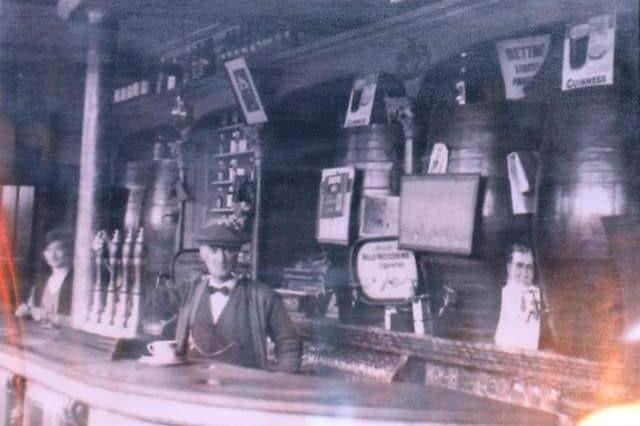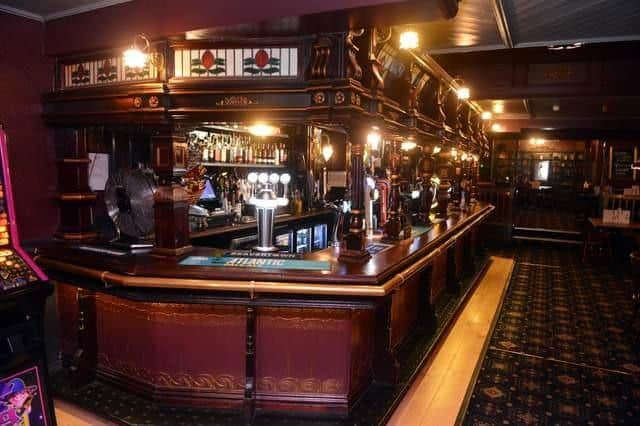When The Vestry was Sunderland's last men-only pub - unearthed BBC footage shows time when women were barred
and live on Freeview channel 276
The footage, found in the BBC archive, shows The Vestry in Fawcett Street, which still trades today – but to any gender.
The 1968 report is almost two minutes long and has been put online as part of the BBC’s Rewind archive project, as part celebrations for the corporation's centenary.
Advertisement
Hide AdAdvertisement
Hide AdUp until 1968, women’s exclusion from bars in Sunderland was commonplace. The policy was to continue in working men’s clubs across the North East for decades to come.


The Vestry hadn’t been the only pub in the then-town to bar females. The Tea Shop in High Street West was another.
It was also renowned for its disapproval of anything that could slide regrettably into pleasure; such as audible conversation. Its tables were barrels. Its chairs were … smaller barrels.
But the Vestry was the last pub to be conquered by women and the BBC was there to film its no-females swansong.


Most men seemed in favour of change
Advertisement
Hide AdAdvertisement
Hide AdPerhaps surprisingly, the person in the footage who seems to most lament what was about to happen was young Look North reporter Luke Casey.
Looking at it today, we are very much into “that was then, this is now” territory.
Mr Casey referred to: “Men getting away from it all. Meaning, by and large, the missus.
“That form of escapism became almost an art form, with hundreds of pubs proudly proclaiming to the world that they served only men.
Advertisement
Hide AdAdvertisement
Hide Ad“But you know what women are like. They could get in where a draught couldn’t and of course, eventually they all got in.
“The Vestry in Sunderland is the last bastion of male independence.”
One drinker laments that The Vestry was a great place to “have a drink and an argument”.
Our man adds: “I’ll have to come in and think before I speak.” The thin end of the wedge.
Advertisement
Hide AdAdvertisement
Hide AdBut the 1960s was a decade of change and, even though the other interviewees were also Wearside men of mature years and presumably no longer with us, they all come across as rather progressive.
One says: “Good idea. I’ve been lonely for years.”
Another (wearing one of the decade’s more magnificent comb-overs) declares: “I think it’s a grand idea. I have no objection to women coming in. They’ll probably brighten the place up.” The Vestry’s landlord was all for it too.
Ask your auntie what it was really like
But were women really immediately escorted from pub premises back then? We carried out some exhaustive research into the subject. Well I rang my Auntie Pat.
She confirmed that as a young woman, working late one evening in Fawcett Street’s Sunderland Building Society in the early 1960s, she and her friend Carol unknowingly popped into the nearby Vestry for an orange juice.
Advertisement
Hide AdAdvertisement
Hide AdThere was no alarm system, but there may as well have been. Panic spread throughout the boozer. Had the situation lasted much longer, militia in black polo-necks would have abseiled through the windows to resolve the situation.
Compromise was reached when Auntie Pat and Carol were served, on the proviso that they then took their orange juices back to the building society. They weren’t even allowed to stand outside the pub on the pavement.
The view from 2022
Looking back at the situation now it seems peculiar; perhaps even unnecessary. It wasn’t a question of “women wanting everything”.
Comparisons have been made by men to their exclusion from the Women’s Institute. The point is a churlish one, judging from the number of men I know personally who actually want to join the WI.
Advertisement
Hide AdAdvertisement
Hide AdThe difference is that women, or at least some of them, like going to pubs. What makes their past exclusion from licensed premises unnecessary is that they rarely want to join an all-male group anyway. We can see why.
Roll forward to 2022 and every Sunday evening I meet with my equally clueless, entirely male cohorts. No woman has ever expressed the slightest desire to tag along and listen to three hours of juvenile rubbish.
One of our recent debates attempted to establish who would prove the superior pugilist in a fist fight between the late Bernard Cribbins and the late Roy Hudd.*
However, it is only fair to point out that not all of our conversations are of this nature. Some of them are complete drivel. Or football. Strangely few women are interested.
Why it matters
Advertisement
Hide AdAdvertisement
Hide AdThe women in our lives are neither invited nor uninvited. They somehow find better things to do and don’t want to come. But if they were specifically and explicitly barred they would take exception. Its human nature.
This takes us back to 1968 and The Vestry. It would have been interesting if the BBC had returned to the pub a year later to see how much the lives of the men in the film had been transformed by this small, yet socially significant piece of women’s liberation.
Not by much we suspect. The 54-year-old footage suggests that it wasn’t a problem for most men; even those beyond a certain age.
Still, there’s always that vocal minority and they may even have a point. Next thing you know we’ll have female prime ministers and a World Cup for women.
You can view the footage at www.bbc.co.uk/news/av/uk-england-cumbria-62648662 .
* It was decided that Cribbins would prevail, due to his superior speed.
